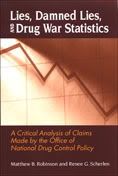 The “war on drugs” doesn’t consume as much oxygen in the public square as it used to. In September 1989, President George Herbert Walker Bush, spoke from the Oval Office, held up a plastic bag filled with white contents and announced,
The “war on drugs” doesn’t consume as much oxygen in the public square as it used to. In September 1989, President George Herbert Walker Bush, spoke from the Oval Office, held up a plastic bag filled with white contents and announced,“This is crack cocaine seized a few days ago in a park across the street from the White House . . . It could easily have been heroin or PCP.”For Bush this speech was public relations homage to an issue that dominated the media and politics during the 1980s. It also impacted Bush’s 1988 presidential election campaign. The near hysteria about the “crack” epidemic in particular resulted in the Anti-Drug Abuse Act of 1988. This act established The White House Office of National Drug Control Policy (ONDCP). According to their website,
“The principal purpose of ONDCP is to establish policies, priorities, and objectives for the Nation's drug control program. The goals of the program are to reduce illicit drug use, manufacturing, and trafficking, drug-related crime and violence, and drug-related health consequences. To achieve these goals, the Director of ONDCP is charged with producing the National Drug Control Strategy. The Strategy directs the Nation's anti-drug efforts and establishes a program, a budget, and guidelines for cooperation among Federal, State, and local entities.”The General Accounting Office reported that as of 2000, ONDCP’s annual budget was almost $20 billion. Depending on whether one factors local incarcerations and law enforcement costs we continue to spend billions annually. So as tax payers, how are we to assess the ONDCP’s performance? Are they having any success at achieving their goals? Do they have the right goals? Is ONDCP accomplishing anything useful or simply justifying its own existence and sustaining the prison industrial complex?
Understandably, we have other things on our minds these days. The “war on terror” has dwarfed the “war on drugs” in recent years and unlike 1988, receiving little attention from presidential candidates this time around. However, given the health repercussions of drugs on society as well as the impact on our justice system, foreign policy, and economy, a thorough analysis of the ONDCP’s efforts are in order.
One interesting cost-benefit analysis of the drug war was posted online by Brian C. Bennett, who in 2005 concluded that,
“trying to stop people from using drugs is still costing us more than three times as much as the drug abuse itself.”Two Appalachian State University professors provide another sobering analysis: Matthew B. Robinson, Associate Professor of Criminal Justice and Renee G. Scherlen, Associate Professor of Political Science. Their book, Lies, Damned Lies, and Drug War Statistics: A Critical Analysis of Claims Made by the Office of National Drug Control Policy (State University of New York Press) primarily focuses on data published by the ONDCP from 2000-2006. They also provide an instructive historical overview about America’s war on drugs dating back to 1875 and illustrate the common themes of racism, media hyperbole and bureaucratic self-interest that have helped define this country’s drug policies.
Robinson, an author of six books, including most recently, Death Nation: The Experts Explain Capital Punishment, agreed to a podcast interview with me about his book and the war on drugs. Please refer to the media player below. This interview is just over thirty minutes and can also be accessed at no cost via the Itunes Store by searching for "Intrepid Liberal Journal."
3 comments:
Understand that the war on drugs is meant to be continuous; no one serriously believes that a prohibition will eliminate illegal drug use. It is simply meant to keep funneling money into police and jails and the like, and keep profits for real drug dealers high, who, with all their money, wield great power across the world, if not in America itself. More so, it is a method of control and domination that the elite ruling class here uses to confuse, screw, and keep the average working class man who smokes a joint down.
We must convince people of the damage done by the "war on drugs", the cruelty, the undermining of respect for law. For comments on how see
randomabsurdities.wordpress.com
I too was excited about Ampligen but my doctor informed me that she was part of the clinical trial and that she would never recommend this drug.
======================================
Andrew William
Addiction Treatment
Post a Comment